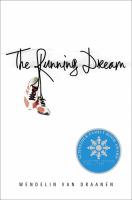
Sixteen-year-old Jessica is the track team's star sprinter until tragedy strikes: the team van is struck, killing one runner and demolishing Jessica's right leg. The book begins with Jessica refusing to acknowledge the result: a stump. But she is slowly reintroduced to life, which involves being fitted for a prosthesis, returning to school, and dealing with the usual tough teachers, mean girls, and one really hot, sensitive, supportive boy. It's a classic problem novel in a lot of ways; accordingly, Van Draanen inserts setbacks with narrative precision, the most affecting of which (surprisingly) is the insurance battle that Jessica's parents face. Overall, though, this is a tremendously upbeat book, with Jessica's family, friends, and community coming together (the track team raises funds to buy Jessica a $20,000 running leg). Even a subplot involving Jessica's friendship with the cerebral palsy-afflicted Rosa is not as treacly as it could have been. Van Draanen's extensive research into both running and amputees pays dividends readers will truly feel what it's like to walk (or run) a mile (or 10) in Jessica's shoes.--Kraus, Daniel Copyright 2010 Booklist
Gr 7 Up-Jessica has run her personal best at a track meet-then there's a tragic bus accident and the high school junior loses her leg as well as her future dreams. From waking up in the hospital and coping with the trauma, to her return home, then school, she tries to grab her life back. On one level the story offers inspiration to those dealing with physical changes in their own lives and the stages of recovery, fight, survival, and victory as Jessica reaches deep to push past her wall of self-pity and loathing, and moves beyond the "finish line." On a deeper level, there is her blind discrimination toward a fellow classmate who has cerebral palsy. Rosa is hard to understand and easy to ignore. She is anchored to a wheelchair. Jessica, encumbered by her crutches and her tender "stump," is seated in the back of the class, out of the way, next to Rosa. She learns that the girl is smart, wise, and friendly. They pass notes and share lunch. Rosa writes, "I wish people would see me and not my condition." When Jessica is running again-on a specially engineered prosthesis-she challenges herself to help her friend be seen. How Jessica orchestrates putting Rosa in the forefront of a community race and pushing her wheelchair across a finish line is a study in faith and determination. Readers will cheer for Jessica's recovery and be reminded to recognize people for their strengths and not overlook them because of their disabilities.-Alison Follos, North Country School, Lake Placid, NY (c) Copyright 2011. Library Journals LLC, a wholly owned subsidiary of Media Source, Inc. No redistribution permitted.


